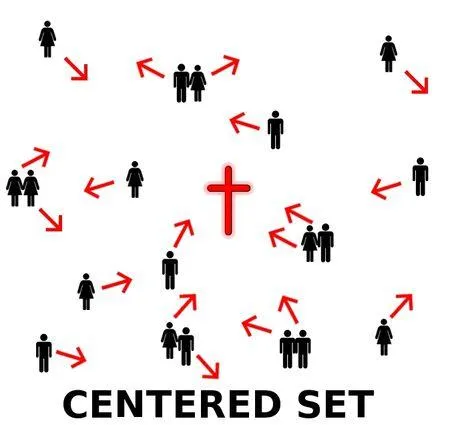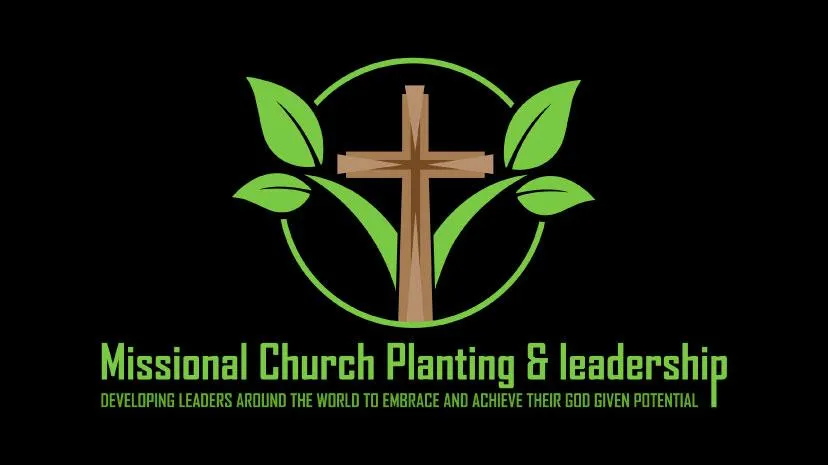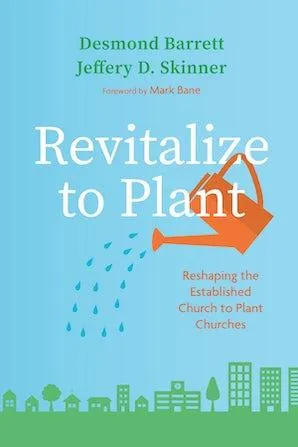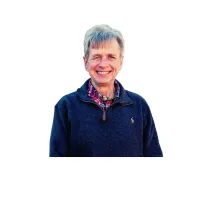
Church Outside the Lines
“It is less a theology precept. It is not even a new way to "do church." It is simply a way of being the Church in the world in a transformative way. One free of judgment. One that encourages transparency, and authenticity about ones struggles without the fear of being left out or kicked out.”
- Dr. Jeffery D Skinner
Introduction:
Churches can take many different tacks when it comes to Christian theology. Bounded set theology, which is the most popular interpretation by the Church today when it comes to Christian Discipleship, and fuzzy set theology, and centered set theology which are recent approaches and interpretations to Christian discipleship strategy.
Theology inside the lines
A theological system known as "bounded-set theology" stresses the existence of a distinct divide between "in" and "out" groups. Such churches typically require their members to adhere to a specific set of doctrines and practices before they can join the congregation. Rather of focusing on community building or connection development, these churches prioritize setting firm boundaries.
Figure 1. Bounded Set Theology

A church that adheres to bounded-set theory can put its emphasis on winning people over to Christianity rather than on developing meaningful friendships with those who don't share its beliefs. They may also emphasize differences rather than similarities, leading to antagonism and isolation from people who hold different views.
An Uncertain Faith
Yet, in fuzzy-set theology, the distinction between believers and unbelievers is seen as fuzzier and more fluid. It's possible that churches with this philosophy care less about defining clear "ins" and "outs" and instead focus on fostering a welcoming and inclusive community. It's more likely that they'll stress the importance of making connections and welcoming everyone.
Figure 2. Fuzzy Set Theology

A congregation that embraces fuzzy-set theology may place a premium on reaching out to the community and making everyone feel welcome. They may also place a larger focus on individual investigation and interpretation of scripture and beliefs, rather than subscribing firmly to a set of views or doctrines.
Theology with a Central Focus
Last but not least, centered-set theology places an emphasis on a common centering on Christ rather than distinct boundaries or beliefs. This type of church may place a greater emphasis on fellowship and connection than on enforcing a strict creed or set of practices. The Creeds are certainly important in the context of a particular community's approach based on their doctrine, but it serves as a focal pint for leading people in the direction of Jesus. For this reason, people describe Centered set discipleship in terms of direction, instead of lines of demarcation that determining who is and who is out.
Advocates in favor of centered-set theology, point to deep relationship building within the community that results. They suggest that bounded set results in and even encourages a fake it to you make it approach which cane create a sense of shame. "Hiddeness" rather than "holiness", they says becomes the mark of a Christian in a bounded set church. Figure 3. Centered Set Theology
Some believe a centered set church is more likely to result in transofrmation as there is not shame in changing directions. When one is moving towards the center, which is Jesus, they will flourish. Sometimes, thing happen that may interrupt ou journey towards the center, which can result in someone moving in the opposite direction of Jesus. Those people aren to removed or scolded. Rather, the community surrounds them with love and encouragement, to remind them that Jesus waiting at the center with open arms, and is in fact still pursuing a relationship with them.
centered-set theology, point to deep relationship building within the community that results. They suggest that bounded set results in and even encourages a fake it to you make it approach which cane create a sense of shame. "Hiddeness" rather than "holiness", they says becomes the mark of a Christian in a bounded set church. Also, rather than stressing a required set of beliefs or practices for membership, they may put more of a focus on the individual's walk with God. This approach tends to be more open and inclusive, with a focus on a shared love for Christ as the cornerstone of the community.
Centered Set theology is challenging to practice.
Most of us, who grew up in church, are very familiar with the language of bounded set and often the reaction to those who reject it, find comfort in "fuzzy set." The difficulty with fuzzy set is there is no redemption or repentance need because there is no sin. Redemption requires sin to be present, but sin is fuzzy" in a fuzzy set church. Centered set is challenging. It requires a radical rethinking of our faith traditions. It is not a program. It is less a theology precept. It is not even a new way to "do church." It is simply a way of being the Church in the world in a transformative way. One free of judgment. One that encourages transparency, and authenticity about ones struggles without the fear of being left out or kicked out.
Our language changes to relational and directional. While the word sin has value, it can be harmful for those who grew up in a religious community heavily rooted in bounded set theology. The important thing for people to understand is the concept of sin. Ultimately sin is a relational word that denotes something that is hurtful to our relationship with others. Even if one perceives his/actions as personal, one's choices can have consequences beyond the individual. Many in today' culture have come to believe that "tolerance" is the supreme virtue.For that reason, the word sin is completely rejected, because even if one is sinful, it must be tolerated. The problem as noted earlier, is then, no one is called to repentance because there is no need for salvation. This might be seen as a universalist approach. In other words sin is irrelevant to to one who perceives tolerance as the most loving action.
Figure 3. Centered Set Theology

Perhaps instead of sin and sinful we might use words that better convey the consequences in terms of the relationship or words that denote the love we have for the individual. i.e. When you lie, it hurts our relationship. I do not know if I can trust you and creates a barrier between us. Perhaps if someone is using drugs, we communicate, because i live you, I do not want to see you hurt yourself. We might use words like dehunanizing" or damaging. These words do not shame or reject. Rather they express a desire to know the other person. they are based in love.
It is easy to fall back into bounded language, and even a fuzzy church can become bounded. those who value tolerance above all else, often swing the pendulum in the extreme direction for intolerance for anyone who is not tolerant enough. One doesn't have to gave a complete understanding of this concept to see the parallels with many in the current political environment.
Conclusion.
In conclusion, a church's theological stance can have far-reaching consequences for the kind of community it builds and the quality of connections it encourages among its members. Bounded-set theology is more common in conservative churches, while fuzzy-set and centered-set theology are more common in progressive churches. A church's approach should reflect its core values and be carefully considered so that it can foster the kind of community it envisions.
Check out Dr. Skinner's free training.
"How to Launch and Grow a Kingdom Minded Ministry with a Multiplication Mentality in Less Than a Year."

Discover how to quickly design professional looking websites.
Download our 25 free design resources guide.
Subscribe to our Newsletter for additional content related to each podcast episode.

Discover how to make your opt-in forms irresistible.
Purchase Dr. Skinner's Newest book which was Co-Authored with Dr. Desmond Barrett.

Revitalize to plant reshapes the conversation around church planting and revitalization.

Dr. Jeffery D. Skinner, Husband, Father,Pastor, Author, Missional Leadership Coach
Father, Husband, Pastor, Planter, coach, podcaster, author, serial entrepreneur, child of God, Dr. Skinner is a passionate Christian Leader who loves helping other ministers and Christian leaders discern their God given vision and mission for their local context to lunch and grow their church or ministry in their local community. He is a connector.
Dr. Skinner finds common ground and crossover and bridges people to each other. Dr. Skinner has over 20 years of entrepreneurial experience in a myriad of secular life such as the IT Industry, but also has over 15 years experience panting churches. He is a Senior Master Trainer for Dynamic Church Planting International.
Dr. Skinner is currently serving as the Global director of Academy Online Coached Training for DCPI, where he is leading a team to develop the coaching curriculum for their 9 training tracks for the world.
Copyright - All Rights Reserved
